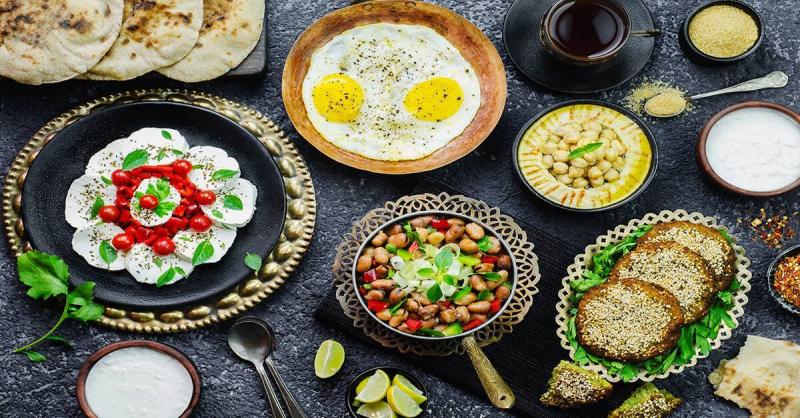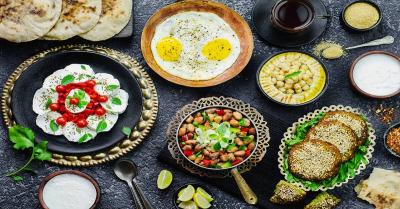The relationship between food and energy lies in the nutrients provided by the diet, as carbohydrates, proteins, and fats supply the calories that the body uses as fuel for its functions. According to Health, not all foods affect energy levels in the same way, and maximizing energy requires a comprehensive dietary approach. While carbohydrates are known for their impact on blood glucose levels, other nutrients can also support energy levels. A balanced diet includes a variety of foods for energy, as follows:
1. **Oatmeal**
Oatmeal is a nutrient-dense carbohydrate rich in vitamins, minerals, and soluble fiber. It is classified as a complex carbohydrate, so it takes longer to digest than average sugary cereals. Half a cup of dry oatmeal provides 27 grams of carbohydrates and 4 grams of fiber, a dynamic combination for controlling blood sugar levels and long-term energy.
2. **Bananas**
Consuming a medium-sized banana provides 26 grams of carbohydrates and 3 grams of fiber, which the body can convert into long-lasting energy. The benefits of bananas also include being rich in potassium, an essential nutrient for kidney, heart, and nerve function, and helps reduce muscle cramps.
3. **Greek Yogurt**
Among all yogurt varieties, Greek yogurt provides the most satisfying protein content to curb hunger. A medium serving of plain Greek yogurt contains about 8 grams of carbohydrates and 20 grams of protein. The carbohydrates in yogurt boost energy, while protein gives the body something else to digest, prolonging the effect of carbohydrates.
4. **Sweet Potatoes**
Sweet potatoes are an excellent source of complex carbohydrates, providing long-lasting effects on energy levels. A medium baked sweet potato provides 24 grams of carbohydrates and 4 grams of fiber. Sweet potatoes are also high in carotenoids and polyphenols, which provide antioxidant and anti-inflammatory properties.
5. **Eggs**
While eggs do not necessarily provide energy on their own, they contain essential nutrients for energy production. Eggs are rich in protein and also contain a range of B vitamins, which play a crucial role in energy production. A boiled egg has 0.07 mg of thiamine, or 6% of the recommended daily intake, which is vital for glucose metabolism for energy.
6. **Beets**
Beets can be a nutritious addition to a balanced diet and have a positive effect on energy. Half a cup of cooked beet slices provides about 8 grams of carbohydrates and around 2 grams of fiber. A moderate amount of carbohydrates coupled with adequate fiber typically translates to steady energy levels. Beets are also an excellent source of antioxidants linked to improvements in cardiovascular health and are rich in nitrates, which the body metabolizes to nitric oxide, essential for vasodilation.
7. **Almonds**
Almonds are nutritional powerhouses containing protein and healthy fats. A 30-gram serving of whole almonds provides about 6 grams of carbohydrates, 6 grams of protein, and 14 grams of fat. Since almonds are low in sugar, they are unlikely to cause a spike in blood sugar levels, and are also a good source of essential nutrients like vitamins B and E and magnesium.
8. **Chia Seeds**
Chia seeds offer a balanced ratio of protein, carbohydrates, and fats, providing a sustainable energy release that keeps you feeling energetic throughout the day. A 30-gram serving of chia seeds contains about 12 grams of carbohydrates, 4 grams of protein, and 9 grams of fat along with fiber.
9. **Spinach**
Spinach offers many potential health benefits, including its role in boosting energy levels. Spinach is rich in iron, which is important for producing red blood cells. Red blood cells are essential for transporting oxygen, which is necessary for energy production.
10. **Quinoa**
Quinoa is known for being a plant-based protein source and a whole grain with a significant impact on energy due to its complete protein profile, containing all nine essential amino acids. One cup of cooked quinoa provides 40 grams of carbohydrates, 8 grams of protein, and 5 grams of fiber, and is a good source of magnesium, potassium, phosphorus, and iron.
11. **Blueberries**
Blueberries are not only vibrant in color but also possess impressive nutrients that provide an energy boost. Blueberries are a good source of carbohydrates and are packed with antioxidants that combat oxidative stress and reduce fatigue. They contain 14 mg of vitamin C per cup, which is 15% of the recommended daily intake.
12. **Chickpeas**
Chickpeas offer a variety of vital nutrients for energy production. They are rich in complex carbohydrates and fiber, providing a steady release of glucose into the body. Half a cup of chickpeas contains 20 grams of carbohydrates, 6 grams of protein, and 4 grams of fiber, making it an excellent choice for steady energy release.
13. **Lentils**
Lentils are full of nutrients, serving as a good source of complex carbohydrates, providing sustainable energy release after consumption and stable blood sugar levels. A quarter cup of lentils has 30 grams of carbohydrates, 12 grams of protein, and 5 grams of fiber, helping regulate digestion and energy.
14. **Beans**
Beans are part of the legume family and are rich in nutrients that can significantly affect energy levels. Beans are filled with complex carbohydrates, which means they can provide a steady release of energy after consumption. Half a cup of beans contains about 20 grams of carbohydrates and 7 grams of fiber.
15. **Dates**
Dates contain glucose, fructose, and sucrose, making them rich in natural sugars and capable of providing a quick energy boost. One pitted date contains 18 grams of carbohydrates, making it a convenient way to enhance energy. Dates also boast several essential nutrients, including copper, iron, manganese, and potassium.




